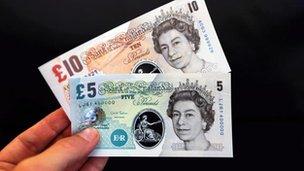Scottish independence: Use of pound could be 'unstable', says Fitch
- Published

Fitch believes the residual UK's debt profile would be "little changed" by Scottish independence
The ratings agency Fitch has warned that plans for an independent Scotland to continue use of the pound could be unstable.
Drawing on Eurozone experience, it said a shared currency without shared fiscal and banking union could risk "high volatility and market turbulence".
Its report also said the credit profile of the residual UK (England, Wales and Northern Ireland) would be neutral.
There would be little change to the residual UK's debt profile, it said.
The report said: "The monetary arrangement following Scottish independence could become a source of uncertainty even if Scotland remained in the sterling currency zone.
"As the intensification of the eurozone crisis showed in 2012, a monetary union without fiscal and banking union is unstable and the prospect of an exit from a monetary union could lead to high volatility and market turbulence, potentially detrimental to all members."
However, a spokesperson for the Scottish government's finance secretary, John Swinney, said: "Comparisons with the eurozone are wrong because the Scottish and rest of the UK economies are well-matched with almost identical levels of productivity, unlike the disparate economies of the euro area.
"A shared currency within a common Sterling area has been backed by the expert work of the Fiscal Commission, including its two Nobel laureates, by many leading business figures and academics, and by currency experts at Deutsche Bank and Citigroup.
"Sharing the pound will also be in the overwhelming interests of the rest of the UK, and has been described by No campaign leader Alistair Darling as 'logical' and 'desirable'."
Former chancellor of the exchequer and chair of Better Together Alistair Darling described the report as "another blow to Salmond's credibility on the central issue of what currency Scotland would use after leaving the UK".
He said: "It is increasingly obvious that the idea of a currency union is dead in the water. To be successful, a currency union requires fiscal and political union - the very thing the SNP are campaigning to dismantle in the United Kingdom.
"This will only increase the pressure on Alex Salmond to tell us what currency we would use if the rest of the UK refuse a currency union. What is the plan B?"
With regard to residual UK's (rUK) debt profile, the report said it would be "little changed".
The ratings agency assumed that public debt would be divided in proportion to gross domestic product (GDP).
Fitch pointed out that dividing North Sea oil geographically would leave rUK with "only 9% of reserves".
But its note added: "The value added of the mining sector, including oil and gas production, has declined by almost 50% over the last decade."